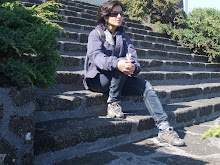Tuesday, December 08, 2009
Book Review: Life on the Golden Horn
Why should you read a travelogue on a journey from England to Turkey written in the early 18th century? There are, after all, plenty of resources today, some would argue too many, to get information on these places that is both current and well-researched. Yet, I can safely say that I’ve learnt more about what life was like in the Ottoman Empire through this travelogue ‘Life on the Golden Horn’ than any history book or encyclopedia could have taught me.
This slender volume is a collection of letters written by the English woman, Mary Wortley Montagu who travelled through Europe to Constantinople as the wife of a diplomat. Incredibly, she is heavily pregnant through the whole journey, but such is her curiosity about people and places that in all her letters back home there is hardly any mention of a trimester or morning sickness. Instead she drinks deep from the cup of life leaving behind a most memorable account of the attitudes of the time but more importantly giving the English-speaking world an important glimpse into the world of women in the Ottoman Empire. Her feminist perspective confirms the place of travel writing as literature, history, anthropology and even international affairs and journalism.
Mary Wortley Montague traveled through the 'war-torn Balkans' and ended up in the Turkish capital, Constantinople, from where she sent some of her most entertaining dispatches. Most accounts of the Ottoman Empire till her arrival had been written by men, with no window into the lives of women and who therefore could only make prejudiced guesses. Montagu ‘s first achievement then is to bring a gendered perspective to travel writing. She writes with a fine confidence, declaring, “Now that I am a little acquainted with their (Ottoman women) ways I cannot forbear admiring either the exemplary discretion or extreme stupidity of all the writers that have given accounts of them.”
Her most memorable accounts are the times spent with various Turkish women. She generally finds them extraordinarily beautiful, extremely warm and lavishly gracious hosts. She says, “’Tis surprising to see a young woman that is not very handsome.” When she enters a hamam for the first time, it is packed with women sprawled on the floor in various poses of indolence in a “state of nature.” But, she remarks, that contrary to the sniggering and whispering that may have accompanied the entry of a new woman into such close circles in Austria or England, here she encounters only smiles and welcoming eyes. She is even urged to undo her elaborate garments to join them in their indolence, but when the complex machinery of an 18th century English gown is revealed to them, the quest is duly abandoned.
The relevance of travel writing is further underscored by Montagu’s observations on the veil. Far from the cloak of oppression it symbolizes today, Montagu finds it a liberating “masquerade”, allowing women to go where they please, take on lovers and be free from street harassment (some things apparently don’t change).
But Montagu wouldn’t be so interesting if she didn’t also say things that would certainly end any travel writers career today. Her prejudices are all laid bare before a more politically correct 21st century reader. For instance, she declares in a sweeping generalization, that all Austrian women are generally ugly. Her offence is not restricted to Austrians. Interestingly, she says that every Turkish Pasha has a Jew who is like his homme d’affaires without whom functions of state could not be carried out. She misses the irony in her own declaration when she claims that Jews have made themselves so useful that they are guaranteed the protection of the state. Far from recognizing why they may need protection, she sees it as Jews exploiting “every small advantage.” Today she can comfortably be accused of displaying anti-Semitism.
Montagu is a product of her times, so her writing often reflects prevailing attitudes. But to her credit she also attempts to bust many of the myths surrounding the Ottoman Empire and its people. She insists they are not the barbarians of popular imagination. By way of example she points out that she sees the Turks treating their slaves in a much more humane fashion that people in England. She also says that crime in the Ottoman Empire is much lower than in, England again.
At some point during these travels, Montagu gives birth to a baby girl. But she is so taken up by the splendors of Turkey that her new daughter barely gets a mention in the letters. In her last letter from this collection she wistfully says that she envies the blissful ignorance of a milk maid who knows nothing of what lies beyond England’s shores. In fact, faced with living under England’s gloomy winter skies again, she almost wishes she forgets about Constantinople’s evening sun herself.
One of the pleasures of Montagu’s writing is the fact that it is unfettered from trying to be politically correct. Her observations are sharp, acerbic, generous, unkind, rapturous. So much of today’s travel writing pales in comparison. That’s why her 18th century account of her travels can still enlighten.
Subscribe to:
Post Comments (Atom)


1 comment:
you make me want to read this book...hopefully I can procure it from the local library here..
wonderful review by the way...
--anjali
Post a Comment